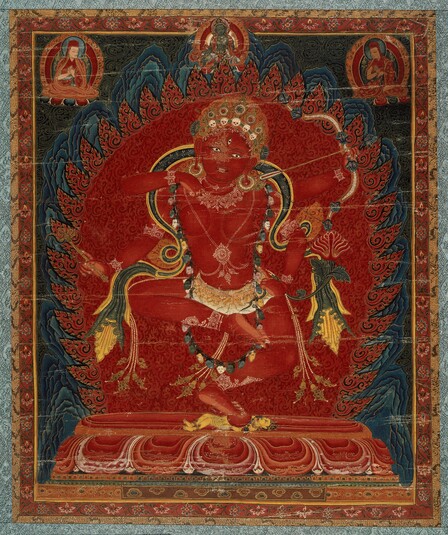
Item: Kurukulla (Buddhist Deity) - Four Armed
| Origin Location | Central Tibet |
|---|---|
| Date Range | 1500 - 1599 |
| Lineages | Sakya, Ngor (Sakya) and Buddhist |
| Size | 101.60x82.30cm (40x32.40in) |
| Material | Ground Mineral Pigment on Cotton |
| Collection | Museum of Fine Arts, Boston |
| Catalogue # | acc.# 67.819, Gift of John Goelet |
| Painting School | Ngor |
Classification: Deity
Appearance: Semi-Peaceful
Gender: Female
Kurukulle (Tibetan: rig che ma. English: The One of the Action Family), Goddess of Power.
Powerful, red in colour with one face, hair flowing upward, three eyes and four hands, slightly fierce in expression, she holds a bow and arrow in the first pair of hands and a golden hook and red utpala flower in the lower pair. Adorned with jewel ornaments, a tiara, earrings, necklaces, bracelets and silk scarves, she wears a lower skirt of tiger skin. Standing atop a yellow corpse, sun disc and lotus blossom seat she dances amidst the circular flames of the fire of pristine awareness in front of a cave edged with dark blue rocky out-croppings.
At the top center is the peaceful goddess Green Tara, with one face and two hands, seated in a relaxed posture. At the left is Ngorchen Kunga Zangpo performing the mudra (gesture) of Dharma Teaching with the two hands at the heart, seated in a relaxed posture. At the right is a lama with the hands in the same teaching gesture and wearing a red pandita hat.
In the Sakya Tradition there are numerous forms of Kurukulle from the four different tantra classifications and all of those can be arranged in five levels of profundity. This particular subject belongs to the first classifications - those associated with the lower tantras of kriya and Charya. In these texts Kurukulle is seen as an emanation of the goddess Tara. In the higher tantras Kurukulle is an emanation of Hevajra and the teachings arise from the Hevajra and Vajrapanjara Tantras.
This form of Kurukulle belongs to a set known as the 'marchen kor sum' or the Three Great Red Deities which is included in a larger set called 'The Thirteen Golden Dharmas' of Sakya. The other two are Takkiraja and Ganapati.
Please see the other companion paintings:
MFA, Boston: Ganapati.
Museum der Kulturen, Basel: Takkiraja.
Jeff Watt 4-2001
Publication: Visual Dharma: the Buddhist Art of Tibet
Thematic Sets
Buddhist Deity: Kurukulla Main Page
Subject: Three Great Red Ones of Sakya
Subject: Thirteen Golden Dharmas of Sakya
Subject: Power Deities List
Collection of Museum of Fine Arts, Boston (Masterworks)
Collection of Museum of Fine Arts, Boston
Subject: Deity Colours - Red (Powerful Activities)
Subject: Ngor Masterworks
Subject: Caves (Deities & Figures)
Buddhist Deity: Kurukulla Religious Context
Buddhist Deity: Kurukulla Study Topics
Buddhist Deity: Kurukulla Masterworks
Tradition: Sakya Deity Paintings

